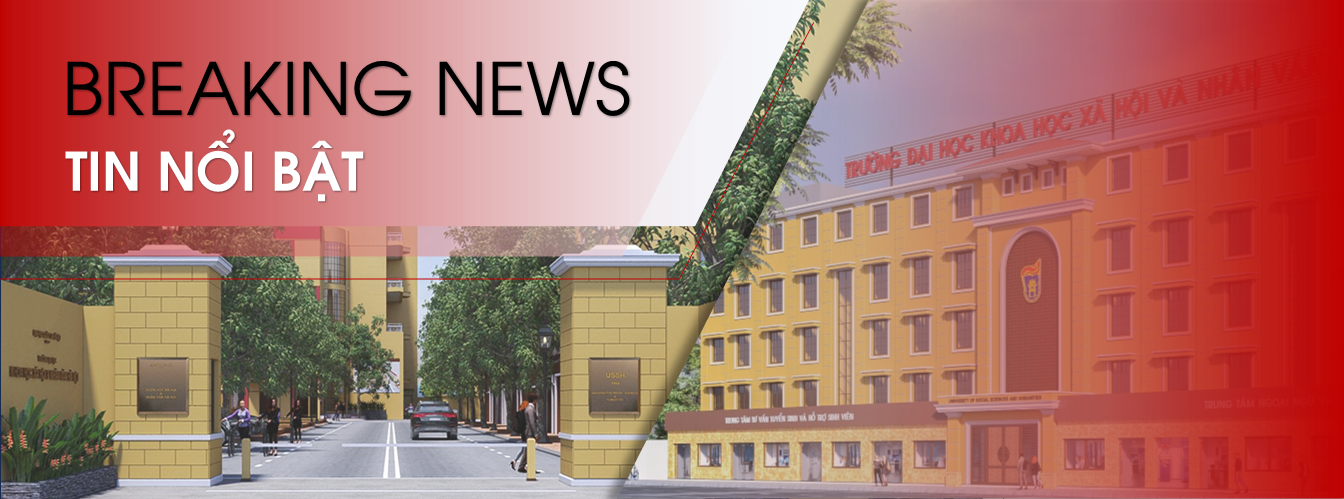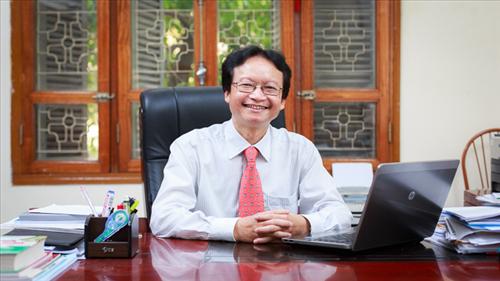The cradle of Vietnamese language training for foreigners.
Professor, could you please explain the role of the initial phase in laying the foundation for the later development of the Faculty?
Before discussing the establishment of the Faculty in 1968, I would like to mention its predecessor, the Vietnamese Language Section of the Faculty of Literature, which was formed in the late 1950s. The Vietnamese Language Section made significant contributions to the training of Vietnamese language and culture for foreigners during the 1960s. From 1965 to 1969, 31 teachers participated in teaching at the Vietnamese Language Section. In 1968, due to the urgent needs of the situation, the then Ministry of Higher Education and Vocational Training decided to establish the "Faculty of Vietnamese Language for Foreign Students," abbreviated as the Vietnamese Language Department. The Faculty became the first official institution entrusted with the important political task of training Vietnamese for foreigners.
- What are the Faculty's most outstanding achievements in the field of Vietnamese language and culture training for foreigners?
The Faculty has trained thousands of foreigners who came to Hanoi to study Vietnamese language, history, literature, culture, and many other fields. In particular, it has participated in training human resources for diplomatic work in many countries. Many translators and high-ranking diplomats from various countries have studied at the Faculty of Vietnamese Language. The Faculty also sent hundreds of teachers to perform international duties, teaching Vietnamese in Cambodia from 1979 to 1991. Many high-ranking officials of the Cambodian and Laotian governments studied Vietnamese at the Faculty. During the 1970s and 1980s, the Faculty was the only training institution in Vietnam, so it can be seen that almost any foreigner who wanted to learn Vietnamese systematically chose to study there.
- Teaching Vietnamese to foreigners during wartime must have been a memorable experience, sir?
In his memoirs about the Faculty, Mr. Phan Van Hai, who joined the Vietnamese Language Department in 1965 and retired in 1995, recounted: “On May 5, 1967, American planes bombed the Thuong Dinh industrial zone, separated from the D building of the University of Foreign Languages and the Me Tri dormitory by a narrow field. On May 6, 1967, the superiors decided to evacuate foreign students. At 4:00 AM on May 7, 1967, all teachers and foreign students from building B7bis of the Polytechnic University rode bicycles towards Huu Trang village (Dan Phuong, Ha Tay) to gather. In the context of wartime evacuation, the Vietnamese Language Department and the Student Management Board were far from the University's Board of Directors and the Ministry of Higher Education and Vocational Training Office. Communication was very difficult. Many urgent matters could not be resolved with timely approval from the Ministry and the University. Every time there was a need, the staff of the Student Management Board had to travel from Huu Trang to the University.” From (Bac Ninh), we cycled at night through key targets of American bombing raids such as Pho Yen train station and Thai Nguyen city…”
Recently, at an international conference abroad, I happened to meet Professor Chuc Nguong Tu, one of China's renowned Vietnam studies scholars, who translated the trilogy of novels "The Advisor" by writer Huu Mai into Chinese. Professor Chuc Nguong Tu told me about his years studying Vietnamese language and culture at House B7 Bis. The most memorable echo from those arduous years of the Vietnam War was the phrase, "Attention, compatriots! Attention! Enemy planes are ... km from the skies over Hanoi... Everyone, quickly go down to the shelters!"
- There used to be a funny story that the Faculty's "graduation requirement" was... becoming an Ambassador?
The Faculty's primary mission is certainly not to train ambassadors, but the reality is that many of its former students (including those from the predecessor Vietnamese Language Department) have become high-ranking diplomats. Notably, to date, more than 10 former students have become ambassadors of various countries to Vietnam, such as Ambassadors Li Jia Zhong, Qi Jian Guo, and Hu Qian Wen of China; Ambassador Anteni Valeriou of Romania; Ambassador Fredesman Turro Gonsalez of Cuba; and Ambassador Saadi Salama of Palestine…
One August afternoon, I heard a knock on my office door and saw an elderly Asian man appear. He introduced himself in Vietnamese as a Mongolian, a former student of the Faculty from 1978 to 1982, and now the Ambassador of the People's Republic of Mongolia to Vietnam. There was also another former student – the first student in my career teaching Vietnamese to foreigners – named Saadi Salama, a Palestinian. At that time, I was 21 and Saadi was 19. Thirty-one years later, we met again; Saadi was now the Ambassador of Palestine to Vietnam.
I am deeply moved by these unexpected and precious encounters. We sowed the seeds with great enthusiasm, and unexpectedly, we reaped such a bountiful harvest. The students we taught with dedication and affection, whom we considered our friends and family, are now using all that knowledge and sentiment to support and promote the development of friendly cooperative relations between Vietnam and other countries.

Scientific conference on research and training in Vietnamese studies and the Vietnamese language, October 19, 2013.
Vietnamese Studies – A New Direction with Many Challenges
- Since 2008, the Faculty has been renamed the Faculty of Vietnamese Studies and Vietnamese Language. What shift in the Faculty's development direction does this event mark?
This is a strategic shift. Previously, the Faculty only trained in Vietnamese Language and Culture for foreigners; now, the Faculty is tasked with training in Vietnamese Studies and Vietnamese Language not only for foreigners but also for Vietnamese students. Previously, the Faculty only offered a Bachelor's program in Vietnamese Language and Culture for foreigners; now, it offers two programs: Vietnamese Studies and Vietnamese Language and Culture. Within the Vietnamese Studies program, there is a specialization A for Vietnamese students and specialization B for foreigners. These two specializations differ in that Vietnamese students focus on foreign languages (English, French, Russian, Chinese), while foreign students focus on Vietnamese language skills.
Vietnamese Studies is a highly interdisciplinary field encompassing many areas from linguistics to history, culture, literature, economics, environment, society, and development. Research in Vietnamese Studies has also yielded significant achievements that we can build upon. By establishing a Vietnamese Studies program, we are following a development trend that aligns with current scientific and practical educational principles.
- What are the differences between the Faculty's Vietnamese Studies training and that of other training units?
Of course, there are many similarities because we both have the Ministry of Education and Training's code for all Vietnamese Studies training institutions. However, what makes us different is that we provide a broad foundation of knowledge and create opportunities for students to delve into specific fields such as: tourism, journalism, office administration, consulting, and language teaching. In particular, compared to other institutions, our Vietnamese Studies students will have a clear advantage in teaching the Vietnamese language and culture to foreigners.
We train graduates in Vietnamese Studies to serve the diverse needs of life, society, and the country. The Faculty has favorable conditions to open postgraduate programs in Vietnamese Studies, starting with a Master's program, and then a Doctoral program.
We have many advantages to develop this new direction, namely: the support and facilitation of Vietnam National University, Hanoi and the University of Social Sciences and Humanities; a team of well-trained, qualified teachers with extensive international experience; and broad international relations, being the only Faculty of Vietnamese Studies in Vietnam currently with both international and Vietnamese students receiving formal training.
- What are the fundamental difficulties the department is facing in carrying out this new task?
Despite having an experienced teaching staff, the Faculty also faces the common challenge of a growing shortage as experienced teachers retire one after another, posing a significant generational gap. Furthermore, while interdisciplinary training experience exists, it lacks a highly systematic approach.
However, after only four intakes of the Vietnamese Studies program for Vietnamese students, the number of applicants has steadily increased. For the first intake, the Faculty even had to accept second-choice applications. Last year and this year, the cutoff scores for the Vietnamese Studies and Vietnamese Language Faculty have ranked in the top 5 out of 16 training units at the University. I believe this is a positive and encouraging first sign, indicating significant societal demand for this field of study and a certain level of prestige within the Faculty.
Teaching Vietnamese helps us to love our national culture even more.
- As someone who brings Vietnamese culture abroad, and also has the opportunity to experience the cultures of many nations around the world, isn't that a source of happiness?
For me, it's definitely a blessing. The greatest happiness for a Vietnamese language teacher is seeing students speak Vietnamese better today than yesterday and better tomorrow than today. Not only me, but colleagues of all generations are "ambassadors" spreading Vietnamese culture to the world through the Vietnamese language. We are proud of this. When teaching Vietnamese, we learn more of the language ourselves, and our knowledge becomes broader and more comprehensive. Every day in class is a day of feeling and discovering more about the Vietnamese language, literature, history, culture, and society. We are also proud that many teachers from our Faculty have been and are currently ambassadors of Vietnamese language and culture at Vietnamese Studies Centers and famous universities around the world. Even some retired teachers are still invited to lecture at many famous universities such as the University of Malaysia, Seoul National University of Foreign Studies, etc.
Furthermore, interacting with many foreigners gives us the opportunity to compare the similarities and differences in language, culture, lifestyle, cuisine, and more. This provides valuable "multicultural" experiences for both work and personal life.
- As the Head of Department at this time, what will you focus on and what will you prioritize?
This is undoubtedly a heavy responsibility for the current Faculty Board. The Faculty will focus on human resources, ensuring that each individual within the unit can leverage their strengths for the common good of the Faculty, and striving to create conditions for the development of young staff. Connecting generations and subsystems into a network is one of the goals we are pursuing. However, to develop, the Faculty must have a comprehensive strategy concretized into five pairs of tasks: Good teachers, good students – Good programs, good curricula – Good research, good application – Good international relations, good professionalization – Improving the material and spiritual well-being of the Faculty's staff. In the future, the Faculty will be a leading training and research institution in Vietnam in the field of Vietnamese studies. This is precisely the expectation and task that Deputy Prime Minister Nguyen Thien Nhan assigned to the Vietnamese Studies department of the University of Social Sciences and Humanities during his visit to the University in 2008.
- Thank you, Professor, and I wish the Department of Vietnamese Studies and Vietnamese Language success in its new endeavors!







